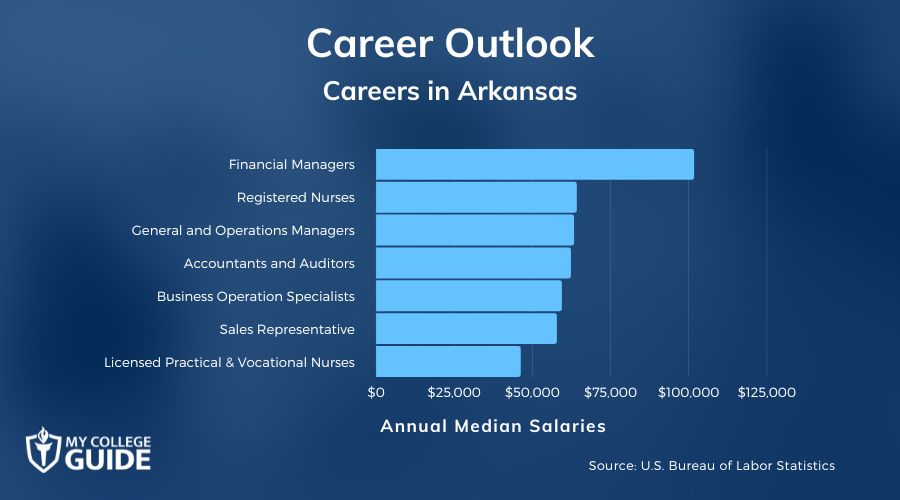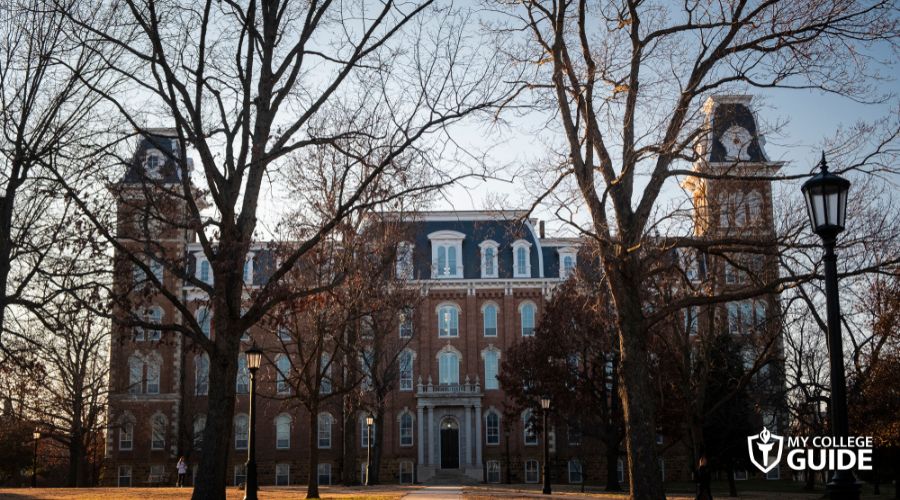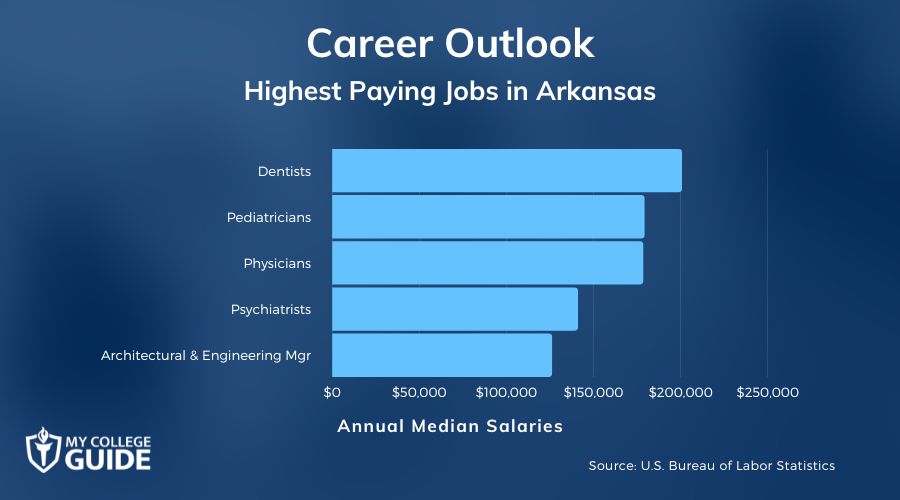Online colleges in Arkansas allow the state to set its sights high when it comes to higher education.

To help encourage degree completion, the state has set a long-term objective of reaching 60% post-secondary attainment by 2025. Their stepping stone plan, “Closing the Gap 2020,” focuses on shorter-term goals, such as:
- Improving college readiness
- Reducing remedial enrollment
- Concentrating on adults and underserved populations
- Improving affordability
One significant step the state made was the new funding formula that links college and university funding to performance measures, such as graduation rates, rather than enrollment numbers.
These ambitious goals and significant changes demonstrate that Arkansas colleges value higher education and want to see students succeed.
Online Colleges in Arkansas

Sometimes college students drop out because it’s difficult to balance school, work, and family. Accredited online colleges offer programs that provide a convenient alternative, allowing students to fit classes in when their schedules allow.
According to data from the National Center for Education Statistics (NCES), almost 24% of Arkansas undergraduate students are enrolled in fully online degree programs. Approximately another 29% participate in Arkansas online colleges’ hybrid options in which students take a mix of online and on-campus classes.
Arkansas universities offer online programs in nearly every field, including liberal arts, business, criminal justice, nursing, and education. There are online programs at the certificate, undergraduate, and graduate levels, as well as degree completion opportunities.
Robust online education offerings aren’t exclusive to large Arkansas online universities. Many private schools offer online and hybrid learning options too.
Common Online Degrees in Arkansas

Colleges in Arkansas offer many different online degree programs at the associate’s, bachelor’s, master’s, and doctoral levels. These are some of the most popular Arkansas online degrees and what they typically entail:
- Nursing: Earning a degree in nursing can give you the opportunity to learn how to provide proper patient care, handle private records, and follow health regulations. Completing a nursing degree can allow you to pursue a career as a registered nurse or licensed practical nurse.
- Business Administration: Business administration degrees are multidisciplinary programs that involve subjects like marketing, human resources, and business law. Graduates from these programs often go on to become analysts or managers in fields like finance, human resources, and health services.
- Organizational Leadership: An organizational leadership degree program can help you develop the management skills that are necessary to succeed as a leader. This degree centers on the ability to properly supervise and motivate an effective team.
- Early Childhood Education: A degree in early childhood education can help you prepare for teaching positions in preschools, kindergartens, and elementary schools. The curriculum focuses on the skills needed to work with diverse populations of young children.
- General Studies: If you have not yet decided on a particular career path, you might wish to pursue a general studies degree. This degree typically involves general education courses, such as English, math, and social sciences, that can transfer to many other degree programs once you’ve selected a long-term field of study.
Completing an online degree can give you the opportunity to earn valuable credentials that can help strengthen your resume when applying for jobs with potential employers.
Overview of Higher Education in Arkansas

According to the National Center for Education Statistics (NCES), the state of Arkansas has 49 degree-granting institutions. Of these, 33 are public, 14 are non-profit and 2 are for-profit institutions.
Data from the NCES shows the average cost of tuition and fees at a 4 year public institution is $8,468 for Arkansas residents and $21,598 for those out of state. Both are below the national average.
The Arkansas Division of Higher Education (ADHE) serves as the administrative staff for the Arkansas Higher Education Coordinating Board.
The ADHE is a 12-member team that works closely with the state’s public colleges and universities. They review academic programs, administer state financial aid programs, review and make recommendations about institutional budgets, and collect data on academic programs.
The ADHE also works with the Southern Regional Education Board (SREB), a 15-state collaboration focused on sharing resources and initiatives to improve higher education. Through this organization, Arkansas residents are able to pursue degrees in participating states and pay in-state rates.
Employment Outlook for College Graduates in Arkansas

Over 1.2 million people work in a wide range of industries across the state of Arkansas. According to the Bureau of Labor Statistics, some of the largest areas of employment are management, transportation, sales, and production.
The median annual wage for employees in Arkansas is $37,270. This falls below the national median wage for all occupations, which is $46,300, but potential earnings differ depending on where you live in the state.
For example, the median annual wage for all occupations in Little Rock is $39,000, which is slightly higher than the median wage for the state as a whole.
Certain careers within the state also have significantly higher salaries. Several career paths, including healthcare and management, have median annual salaries that are more than double the rate for all occupations in the state.
Careers & Salaries in Arkansas

Earning an online degree in Arkansas can help prepare you to enter a variety of rapidly growing industries. Some of the most prominent areas of employment in the state include nursing, finance, tourism, and education.
An online college degree may help you qualify for an in-demand position. You might become a registered nurse, an accountant, or a manager. Many of these jobs offer competitive salaries that are higher than the median annual wage for all occupations in Arkansas.
According to the U.S. Bureau of Labor Statistics (BLS), these are some of the most popular positions for working professionals in Arkansas.
| Careers | Annual Median Salaries |
| Financial Managers | $101,650 |
| Registered Nurses | $64,130 |
| General and Operations Managers | $63,250 |
| Accountants and Auditors | $62,250 |
| Business Operation Specialists | $59,360 |
| Sales Representative, Wholesale and Manufacturing, Except Technical and Scientific Products | $57,760 |
| Licensed Practical and Licensed Vocational Nurses | $46,200 |
| Bookkeeping, Accounting, and Auditing Clerks | $38,110 |
| Customer Service Representatives | $34,510 |
| Nursing Assistants | $29,180 |
The degree you earn can help determine which career path you should pursue. For example, a business degree is often a strong foundation for a career as a general or operations manager, while an early childhood education degree may be ideal if you hope to work as a kindergarten teacher.
Online Universities in Arkansas Admissions Requirements

Every online college or university in Arkansas has a its own admissions requirements, but there are common criteria you are likely to see. Some common requirements are:
- ACT or SAT test scores (not required at all schools)
- Letters of recommendation
- Personal statement
- High school and college transcripts
You will also need to submit an official application and may have to pay a fee.
AR Online Colleges Accreditation

When choosing between Arkansas online degree programs, regional accreditation is one of the most important factors to consider. To earn regional accreditation, institutions must complete an assessment process.
Regional accreditation is incredibly beneficial. Regional accrediting bodies have very high standards, so a regionally accredited program is likely to offer a quality academic experience. Many employers prefer degrees from regionally accredited schools for this reason.
It’s also generally easier to transfer credits from schools with regional accreditation status, which is important if you plan to attend graduate school or need to switch schools mid-program.
Financial Aid and Scholarships

There are many financial aid opportunities to pursue for those attending online colleges in AR. The first step to accessing this aid is typically completing the Free Application for Federal Student Aid (FAFSA).
To complete the FAFSA, you will need to provide information about your income, assets, taxes, and other finances. You’ll need to provide information about your parents’ finances as well, unless you’re considered independent.
This information will be used to determine how much and what kinds of financial aid are offered to you.
Typically, the ideal types of financial aid are grants and scholarships because they do not have to be repaid as long as they are used properly.
This aid is often awarded to those who demonstrate financial need or academic excellence but may also be given out based on intended major, geographic region, specific achievements or talents, etc.
These are some grants and scholarships that may be pursued by Arkansas residents looking to enroll in online degree programs in Arkansas:
- Academic Challenge Scholarship: Graduated schedule of award
- Arkansas Future Grant (ArFuture): Covers public school tuition and fees
- Arkansas Health Education Grant (ArHEG): In-state tuition rates at out-of-state schools
- Governor’s Distinguished Scholarship: Pays tuition, fees, and room and board up to $10,000 per year
- State Teacher Education Program (STEP): Up to $4,000 per year for up to 3 years
- Teacher Opportunity Program (TOP): Pays up to $3,000 per year to cover out-of-pocket tuition and fees
- Workforce Challenge Scholarship: Pays up to $800 toward a certificate or program
You can find more information about the scholarships above as well as scholarships for dependents of law enforcement officers, military dependents, single parents, and more on the ADHE website.
You can also check out Arkansas’s state-wide college planning tool, “Fund My Future.” This is a free resource providing scholarship searches, FAFSA assistance, financial aid checklists, scholarship application tips, and so on.
Many of these tools are available to the public already, but the information provided here is specific to Arkansas students and organized on one site.
Arkansas Online Education Resources

Students in Arkansas can turn to many valuable online resources. These are some of the organizations that offer guidance:
- Arkansas Division of Higher Education: The ADHE has data on all the state’s colleges and universities.
- Arkansas Brighter Future 529: This site provides information about college savings plans and the Aspiring Scholars Matching Grant program.
- Southern Regional Education Board: The SREB has information on subjects like college affordability and online education.
These resources provide information that can help you make the best possible decision about which college and program to attend.
How Much Does It Cost to Go to an Online College in Arkansas?

The cost of earning a degree in Arkansas depends on several factors, including whether you are an in-state student, whether the college is private or public, and how much financial aid you receive.
For example, an in-state student in Arkansas might pay around $8,000 a year in tuition and fees, while an out-of-state student might pay over $19,000 for the same school. Many community and technical colleges have lower rates than 4 year colleges and universities.
Attending college online is also often less expensive than attending in person because of the cost of housing, fees, and parking.
Tuition Breaks for Out-of-State Students

Out-of-state students who choose to attend college in Arkansas may be able to save money or receive in-state tuition rates.
One option is to attend a college that participates in the Academic Common Market (ACM). The ACM allows qualifying students to receive in-state tuition rates if the degree program they plan to pursue is not offered within their home state.
A total of 15 states are currently members of the ACM. In addition, some states, such as Louisiana, Mississippi, Missouri, Tennessee, Texas, and Oklahoma, have reciprocity agreements with certain colleges in Arkansas.
The agreements make qualifying students from these states eligible for in-state tuition rates at participating colleges.
Other colleges may offer a flat tuition rate for all online students, regardless of where they live. These students often have to pay additional fees, such as online access fees, along with their tuition.
What Jobs Are in High Demand in Arkansas?

Arkansas has job opportunities in many industries, but some industries are growing more quickly than others. According to the Arkansas Division of Workforce Services, these are some of the most in-demand careers in Arkansas:
- Healthcare support workers
- Information and record clerks
- Healthcare practitioners
- Educational instruction and library workers
- Business operations specialists and managers
The Arkansas Division of Workforce Services reports that many of these areas of employment have several thousand job openings each year.
What Are the Highest Paying Jobs in Arkansas?

There are many profitable career paths in Arkansas, though the amount of money you earn ultimately depends on your experience, employer, and qualifications. According to the Bureau of Labor Statistics, some of the careers with the highest median annual wages in the state are:
- Dentists: $200,530
- Pediatricians: $179,070
- Physicians: $178,320
- Psychiatrists: $140,880
- Architectural and Engineering Managers: $126,010
These positions typically require a high level of education, such as a master’s or doctoral degree, and several years of professional experience. Earning an online degree may help you begin the journey toward a high-paying career.
List of Online Colleges in Arkansas
Methodology: The following school list is in alphabetical order. To be included, a college or university must be regionally accredited and offer degree programs online or in a hybrid format.

Arkansas State University has multiple start dates throughout the year and offers accelerated bachelor’s and master’s degree programs. The programs are designed with working students in mind.
A-State students can choose from a wide variety of degrees, such as a BA in Communication Studies, a BS in Radiologic Sciences, or an MAT in Special Education.
Arkansas State University is accredited by the Higher Learning Commission.

Arkansas Tech University is committed to helping all nature of students get the education they want. ATU’s online programs are designed to fit with students’ schedules, whether they work or have families.
ATU offers endorsements like Dyslexia Therapist, bachelor’s degrees in fields like history, and master’s degrees in fields like emergency management and homeland security.
Arkansas Tech University is accredited by the Higher Learning Commission.

Central Baptist College’s online program is called Professional Adult College Education (PACE). It’s designed specifically for working adults.
CBC offers bachelor’s degrees in fields like business administration, leadership, ministry, human resource management, and more. Courses start every 5 weeks and may be attended fully online or in a hybrid format.
Central Baptist College is accredited by the Higher Learning Commission.

Harding University aims to give its students all the preparation needed for their careers while staying rooted in the Christian faith. While courses at Harding are online, students may be required to visit campus one or more times, depending on their program.
The university offers certification, licensure, and bachelor’s and master’s degree programs in a variety of fields, including ministry, kinesiology, and sports administration.
Harding University is accredited by the Higher Learning Commission.

Henderson State University’s online program focuses on master’s and specialist degrees for current or prospective teachers.
Henderson works with in-service teachers and their schedules to make earning a master’s degree possible. HSU offers master’s in fields like special education, developmental therapy, educational leadership, and sports administration. It also offers a specialist program in educational leadership.
Henderson State University is accredited by the Higher Learning Commission.

John Brown University was ranked the #1 best online college in Arkansas by the College Consensus. JBU strives to provide students with a quality education through a Christ-centered program.
JBU students have the potential to earn their master’s sooner with the school’s 4+1 bachelor’s and master’s programs. Degrees in marketing, psychology, cybersecurity, and more are offered.
John Brown University is accredited by the Higher Learning Commission of the North Central Association of Colleges and Schools.

Ouachita Baptist University is a Christian-centered university offering online bachelor’s and master’s degree programs. Programs start three times a year, and courses are 8 weeks long. Most of the degrees can be earned fully online.
Undergraduate programs include a BA in Interdisciplinary Studies or Organizational Leadership. Graduate programs include Applied Behavior Analysis and Education.
Ouachita Baptist University is accredited by the Higher Learning Commission.

Southern Arkansas University offers online degree programs for a variety of learners, from working students to graduate students to retirees.
SAU also has training programs for those who need assistance with digital learning. Courses are 7 weeks long. Students can earn degrees like a BBA, an MBA, an MA in Teaching, or an MS in Science in Agriculture.
Southern Arkansas University is accredited by the Higher Learning Commission.

The University of Arkansas—Fort Smith’s online programs are rigorous and intended for students dedicated to getting a degree.
Online courses may be asynchronous, synchronous, or hybrid. UAFS offers a limited number of certificates and associate, bachelor’s, and master’s degrees in areas like criminal justice, organizational leadership, and healthcare administration.
The University of Arkansas – Fort Smith is accredited by the Higher Learning Commission.

The University of Arkansas—Little Rock offers online degree programs for undergraduate and graduate degrees. All courses are fully online and asynchronous.
UA Little Rock is well-known for its Master’s in Social Work program. The school offers degrees in several other fields as well, including nursing, learning systems technology, and business analytics.
The University of Arkansas – Little Rock is accredited by the Higher Learning Commission.

The University of Arkansas—Monticello is an NC-SARA-approved institution, meaning its online degrees should be recognized by most states. Most of UAM’s distance learning programs are entirely online, but some require students to come to campus for certain things, like exams.
UAM offers degrees online in fields like music, forestry, and debate.
The University of Arkansas – Monticello is accredited by the Higher Learning Commission.

The University of Arkansas—Pine Bluff offers online degree programs with 20 different start dates throughout the year. Each course is a little under 12 weeks long. All online students pay in-state tuition, even non-residents.
UA Pine Bluff offers self-paced and more traditional courses in fields like English, community college leadership, and construction management.
The University of Arkansas – Pine Bluff is accredited by the Higher Learning Commission.

The University of Arkansas for Medical Sciences offers degree completion courses in several medical fields. For most programs, students are required to have an associate degree.
Degrees can be completed in fields like cardio-respiratory care and diagnostic medical sonography. The school also offers a full bachelor’s degree program in nuclear medicine imaging sciences.
The University of Arkansas for Medical Sciences is accredited by the Higher Learning Commission.

The University of Central Arkansas is committed to helping students earn degrees online through support from professors and program coordinators. All students pay flat-fee tuition. Courses are either 8 or 16 weeks long.
There’s no distinction between online and on-campus degrees. UCA offers bachelor’s, master’s, and doctorate degrees in fields like addiction studies and nutrition.
The University of Central Arkansas is accredited by the Higher Learning Commission.

Williams Baptist University strives to give students a Christ-centered and affordable college education.
WBU currently offers one online degree program, a BS in Criminal Justice. The program requires the completion of 120 credit hours, with 45 hours spent in content-area courses. The curriculum consists of courses such as Criminological Theory and Terrorism and Counterterrorism.
Williams Baptist University is accredited by the Higher Learning Commission.
Getting Your College Degree in Arkansas Online

The variety of online degrees in AR makes it possible for students with many different academic interests to pursue their studies. Online degree programs have flexible schedules and are often more affordable than in-person options.
Earning a college degree may create the opportunity to build a career in one of the many growing industries in Arkansas, including education, business, or healthcare. Whether you want to become a teacher, nurse, or accountant, a college degree may help you achieve your professional and personal goals.
You can begin your academic journey by researching accredited online colleges in Arkansas. You can also view our Online Colleges in Arizona and Online Colleges in California guides for more options.
